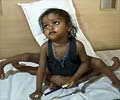Human Fertilisation and Embryology Authority, UK has warned that IVF children may carry a higher risk of birth defects than those born in the normal course.
The updated guidance from the Human Fertilisation and Embryology Authority (HFEA) will refer to findings that test-tube babies could be up to 30 per cent more likely to suffer from health problems and genetic flaws.Research published online last month in the Human Reproduction journal found that IVF babies suffer from higher rates of birth defects than those conceived naturally.
Scientists from the US Centres for Disease Control and Prevention found IVF babies suffered higher rates of conditions such as heart valve defects, cleft lip and palate, and digestive system abnormalities. Patients will be able to access the HFEA's advice on potential risks on its website from next month.
In addition, IVF babies have a small but increased risk of rare genetic disorders including Angelman Syndrome, which leads to delays in development, and Beckwith-Wiedemann Syndrome, which can lead to a hole in the abdomen and learning difficulties.
However, the HFEA will also make clear that the majority of babies born by IVF are healthy and that more research is needed into birth defect issues. More than 12,000 babies were born in 2006 as a result of IVF, according to HFEA figures.
A spokesman said: "As with any medical procedure, it is important patients understand the risks."
Advertisement
Another is that older women - whose eggs are of a lower quality - are more likely to turn to IVF to conceive.
Advertisement
But now the watchdog is to warn generally of the risks associated with all types of the procedure.
Last night, IVF specialist Richard Kennedy, of the British Fertility Society, said: 'We have known for some time that there is a slightly increased risk of abnormalities for all IVF treatments, not just ICSI.
'It is only right that patients should be told about this and it is a good thing that the HFEA is updating its guidance.
'What we need to remember is that the overall risks of an abnormality occurring is increased with IVF but it is still a small risk. Nevertheless, patients still need to be aware.'
Around 2.5 per cent of babies in the general population are born with some form of birth defect, while in IVF, this may rise to around 3.5 per cent, he added.
Josephine Quintavalle, of the campaign group Comment on Reproductive Ethics, said: 'IVF should never be the first port of call for someone trying to conceive and we need a lot more money to go into research to help restore fertility for natural conception.
'IVF is often used when couples are "sub-fertile", meaning they take longer to conceive, or by single women wishing to conceive using donor sperm. Patients need to consider the risks.'
Source-Medindia
GPL/L













